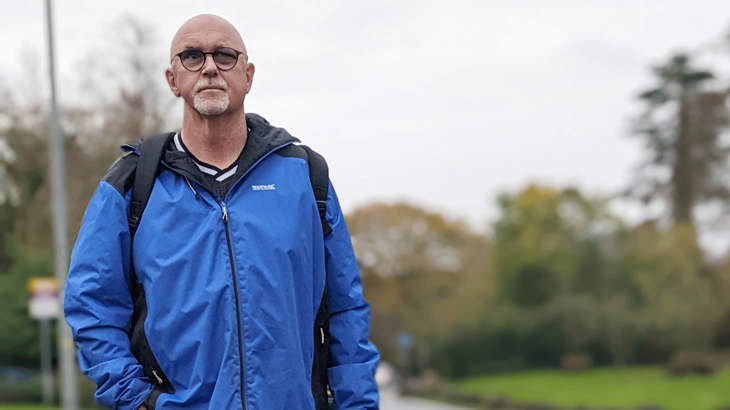73% of disabled people say that stopping vehicles parking on pavements would help them walk or wheel more. As someone who is registered blind, Mark explains how a ban on pavement parking would vastly improve his journeys when walking with his guide dog. As a participant in our Disabled Citizens’ Inquiry, Mark voices the challenges that prevent him from walking freely on a daily basis, and what he’d say if he had an audience with the council when it comes to active travel.
Watch Mark's story.
“I got my guide dog, Bobby, in 2019, after being on the waiting list for two years, and he’s totally changed my life.
“He’s given me more confidence to go out.
“Before this, I was in the dark with a cane and I just didn’t want to go out.
“People notice my guide dog much more than they did my cane. They used to trip over it and take it out on me as if it was my fault.
“Bobby’s very reassuring. Hopefully, I’ll never have to go back to a cane.
“I just get on with life as much as I can. My sight impairment doesn’t hold me back.”
Council officials need to consider the needs of blind, visually impaired and deaf people
“If I had an audience with the council, you'd have to hold me back.
“The first thing I’d bring up is pavement parking. Where I live there are so many cars that park on the pavement. I’ve got to walk around them and go on the road.
“It’s absolutely horrendous.
“On a 200-yard walk, this could happen maybe four or five times.
“Sometimes, when I'm on the road, I can’t see oncoming traffic.
“Bobby isn’t trained to tell me that there’s a car coming so I’ve got to rely on sound.
“Secondly, I’d bring up the issue of some pelican crossings not working properly.
“Not all pelican crossings bleep when the light turns green, but the button unit should have a small cone underneath which you can feel spinning when it’s time to cross.
“Quite a few cones in my area don’t work, so I can’t cross unless somebody else is there at the same time.
“This can mean I need to get on a bus, just to get off on the other side of the road once it’s on its return journey.
“This could take half an hour extra.
“It’s very important for the council to think about blind, visually impaired and deaf people and for pelican crossings to be working properly.
“Another thing is that the low flower beds in Morriston are quite a trip hazard.
“As are all the tables, chairs and advertising boards outside shops in Swansea city centre.
“I’d like to see these changed too.”

Photo: Tom Hughes/Sustrans
Crossing with caution
“I’ve got a great bus service in my area and great drivers. They know about my condition and they can see my dog.
“Sometimes if I take the bus into Swansea I take a less direct route as it gets really busy, especially on the weekends.
“When I’m out and about I use pelican or zebra crossings all the time now after I had quite a frightening experience crossing at an island.
“I didn’t see a car coming and instead of stopping, it swerved around me.
“I won’t cross roads without using a functioning crossing or unless I’m with someone.”





